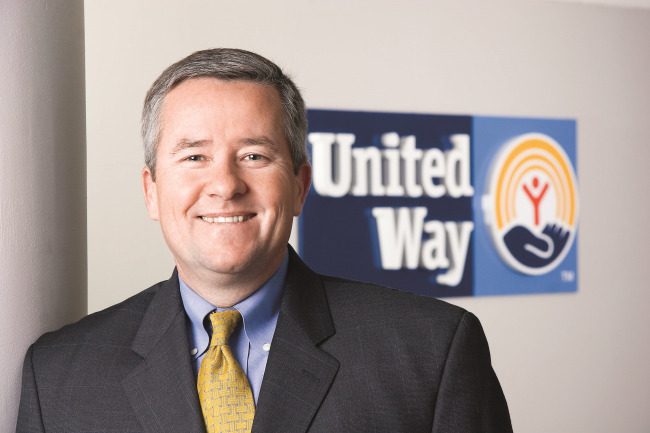[Herald Interview] Philanthropy is about finding shared value: UWW chief
By Korea HeraldPublished : Sept. 28, 2014 - 21:12
Philanthropy is not about society’s “haves” giving their wealth to the “have-nots,” but about inspiring governments and corporations to find value via their contributions, according to the chief of the world’s largest nonprofit organization.
“Philanthropic activities are just like business projects ― one should first find the value, set a detailed goal and take the most cost-effective actions,” Brian Gallagher, president and CEO of United Way Worldwide, told The Korea Herald in an interview.
“Conventional corporate social responsibility makes sure that the corresponding company does what is ethical, but the next evolution is to find what the company may do for good business that is also beneficial for society.”
“Philanthropic activities are just like business projects ― one should first find the value, set a detailed goal and take the most cost-effective actions,” Brian Gallagher, president and CEO of United Way Worldwide, told The Korea Herald in an interview.
“Conventional corporate social responsibility makes sure that the corresponding company does what is ethical, but the next evolution is to find what the company may do for good business that is also beneficial for society.”

The UWW ― the umbrella organization for nearly 1,800 community-based regional units around the world ― is the single-largest nonprofit organization, raising an annual $5.2 billion. In Korea, it operates in partnership with the Community Chest of Korea.
Gallagher was here this week to participate in Friday’s Global CSR Conference 2014, hosted by Hur Dong-soo, chairman of the Community Chest of Korea.
“Corporate philanthropy in Korea is strong, which is one of the reasons why CCK has the second-largest revenue among global community chest units,” Gallagher said.
“But when it comes to the detailed perspective and methods, Korean companies need to adapt themselves to changes, (and) realize that it is no longer sufficient just to donate cash.”
Such changes include the idea of “collective impact,” a term used to explain the positive impact derived when several organizations from different sectors unite for a common social goal.
One example of collective impact involved John Deere, a U.S.-based farm equipment manufacturer.
The company had a growing interest in India, where 78 percent of the agricultural workers are women and most of them seem to be at a disadvantage in terms of payment, safety and training.
So in order to increase the output per dollar invested, the firm started to provide job training, improved safety and easier access to equipment to the female Indian farmers.
“United Way India played an intermediate role ― making sure that the local government provides training and safety accountability, and that the corporation invests (the necessary funds) and equipment.”
These efforts helped benefit more than 500 Indian people, and John Deere’s investment output jumped by over 200 percent. Gallagher noted that Korean firms such as Samsung Group are also aware of the mutual benefits of social contributions, which is why they uses the term “fish and water” to mean that firms and society are fated to coexist.
Meanwhile, a major point of concern for the UWW is how to secure more participants for philanthropic activities.
“Conglomerates make generous contributions, but the level of involvement coming from the employee level is still quite low, especially in smaller companies,” Gallagher said.
Even in the U.S., there has been a steady decline in the number of average donors and a rise in corporate donors, which means that the wealthy give more while others do not, he added.
“As Seoul is to host the Philanthropy Roundtable next year, we hope to bring up such tasks and share valid solutions.”
By Bae Hyun-jung (tellme@heraldcorp.com)
-
Articles by Korea Herald








![[Graphic News] More Koreans say they plan long-distance trips this year](http://res.heraldm.com/phpwas/restmb_idxmake.php?idx=644&simg=/content/image/2024/04/17/20240417050828_0.gif&u=)
![[KH Explains] Hyundai's full hybrid edge to pay off amid slow transition to pure EVs](http://res.heraldm.com/phpwas/restmb_idxmake.php?idx=644&simg=/content/image/2024/04/18/20240418050645_0.jpg&u=20240419100350)






![[From the Scene] Monks, Buddhists hail return of remains of Buddhas](http://res.heraldm.com/phpwas/restmb_idxmake.php?idx=652&simg=/content/image/2024/04/19/20240419050617_0.jpg&u=20240419175937)

![[KH Explains] Hyundai's full hybrid edge to pay off amid slow transition to pure EVs](http://res.heraldm.com/phpwas/restmb_idxmake.php?idx=652&simg=/content/image/2024/04/18/20240418050645_0.jpg&u=20240419100350)

![[Today’s K-pop] Illit drops debut single remix](http://res.heraldm.com/phpwas/restmb_idxmake.php?idx=642&simg=/content/image/2024/04/19/20240419050612_0.jpg&u=)